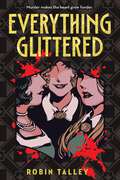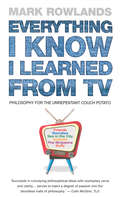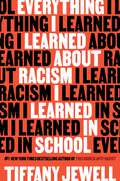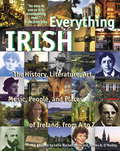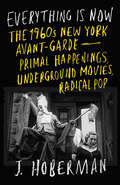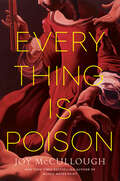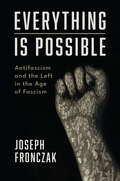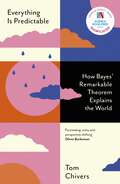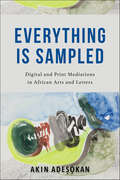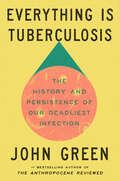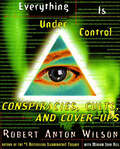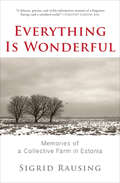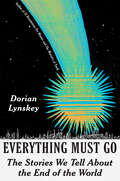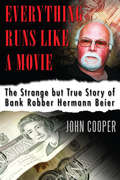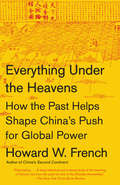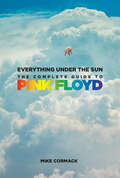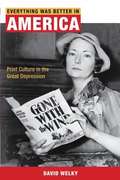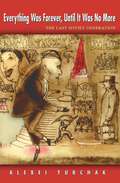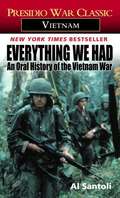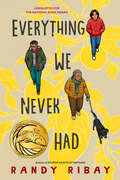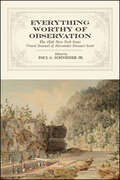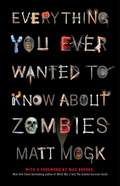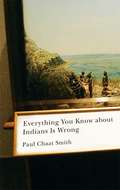- Table View
- List View
Everything Glittered
by Robin TalleyIn this queer historical thriller from a New York Times bestselling author, society girls try to find a murderer in a city filled with secrets and stunted by shame. Perfect for fans of Last Night at the Telegraph Club. It&’s 1927 and the strict laws of prohibition have done little to temper the roaring 20s nightlife, even in the nation&’s capitol. Everyone knows the booze has never stopped flowing, especially amongst the rich and powerful, and seventeen-year-old Gertrude and her best friends Clara and Milly are determined to get a taste of freedom and liquor, propriety be damned. But after sneaking out of the Washington Female Seminary to visit a speakeasy, they return to discover that their controversial young headmistress, Mrs. Rose, has been murdered. Reeling from the death of her beloved mentor, Gertrude enlists her friends in her quest to clear Mrs. Rose&’s reputation, while trying to keep her own intact. But in Prohibition Washington, it&’s difficult to sidestep grifters, bootleggers, and shady federal agents when investigating a murder. And with all the secrets being uncovered, Gertrude is finding it harder and harder to keep her attraction to her best friends hidden. A proper, upscale life is all Gertrude has ever known, but murder sure makes a gal wonder: is all that glitters really gold?
Everything I Know I Learned From TV: Philosophy For the Unrepentant Couch Potato
by Mark RowlandsEverything I Know I Learned From TV uses characters we all know and love and their TV worlds to explain the great questions of philosophy. The only qualifications you need to join in are ownership of a sofa, a remote control, a sense of humour and an enquiring mind. The philosophy discussed is very much 'life' philosophy, answering the questions we all want to know: How do you define what is a good life to lead? The Simpsons disagree over the right way to live with Nietzsche and Diogenes on hand to take sides. What is real happiness? Aristotle fights Descartes for the heart and mind of Sex and the City's Carrie Bradshaw. Can a good person do a bad thing? Kant and Socrates pay a call on Tony Soprano and his latter-day Mob to talk moral philosophy. Where does love end and friendship begin? Rachel and Ross ask Plato about the philosophy of emotions and wonder if they're just good friends. Is the pursuit of self-knowledge a good thing? Socrates helps Niles and Frasier Crane and their dad deal with the relative merit of the examined and the unexamined life. And much more.
Everything I Learned About Racism I Learned in School
by Tiffany JewellFrom the #1 New York Times bestselling author of This Book Is Anti-Racist and The Antiracist Kid, Tiffany Jewell, this YA nonfiction book, highlighting inequities Black and Brown students face from preschool through college, is the most important, empowering read this year.From preschool to higher education and everything in between, Everything I Learned About Racism I Learned in School focuses on the experiences Black and Brown students face as a direct result of the racism built into schools across the United States.The overarching nonfiction narrative follows author Tiffany Jewell from early elementary school through her time at college, unpacking the history of systemic racism in the American educational system along the way. Throughout the book, other writers of the global majority share a wide variety of personal narratives and stories based on their own school experiences.Contributors include New York Times bestseller Joanna Ho; award winners Minh Lê, Randy Ribay, and Torrey Maldonado; authors James Bird and Rebekah Borucki; author-educators Amelia A. Sherwood, Roberto Germán, Liz Kleinrock, Gary R. Gray Jr., Lorena Germán, Patrick Harris II, shea wesley martin, David Ryan Barcega Castro-Harris, Ozy Aloziem, Gayatri Sethi, and Dulce-Marie Flecha; and even a couple of teen writers!Everything I Learned About Racism I Learned in School provides young folks with the context to think critically about and chart their own course through their current schooling—and any future schooling they may pursue.
Everything Irish: The History, Literature, Art, Music, People, and Places of Ireland from A to Z
by Lelia Ruckenstein James A. O'MalleyHere, in one complete volume, is the depth and breadth of the great island nation and its people represented in an easily browsed, friendly format. From the Abbey Theatre to the Dublin storyteller Zozimus; from the origin of the Troubles to the origin of the limerick; from the stunning beauty of Connemara to the shattering tragedy of Bloody Sunday; from the greatest writers of the English language to the "confrontational television" of Gay Byrne's The Late Late Show-every aspect of Irish culture, geography, and history is collected and annotated in more than 900 entries from A to Z. Readers will encounter heroes and terrorists, poets and politicians, all of Ireland's counties, ancient myths, and pivotal events--all expertly and succinctly described and explained. With entries written by some of the world's leading authorities on Ireland,Everything Irish is perfect for everyone, from the inquiring reader to the serious student. You can spend a few minutes learning about the much-maligned Travelers and then move on to the equally contentious (in its time) medieval tithe. Visit the majestic Cliffs of Moher and then delve into an analysis of paramilitary groups like the Irish Republican Army and the Ulster Volunteer Force. Explore the ruins of a Romanesque castle or experience the piercing light of the winter solstice inside prehistoric Newgrange, a passage grave older than the pyramids. Across centuries and across counties, the rich landscape of Irish life and heritage springs to life in these pages. An indispensable source of fascinating information and captivating anecdote, this is one book that will never be far from the hands of those with curious minds or an adventurous spirit.
Everything Is Now: The 1960s New York Avant-Garde Primal Happenings, Underground Movies, Radical Pop
by J HobermanA groundbreaking cultural history of 1960s New York, from the legendary writer on art and filmLike Paris in the 1920s, New York City in the 1960s was a cauldron of avant-garde ferment and artistic innovation. Boundaries were transgressed and new forms created. Drawing on interviews, memoirs, and the alternative press, Everything Is Now chronicles this collective drama as it was played out in coffeehouses, bars, lofts, storefront theaters, and, ultimately, the streets.The principals here are penniless filmmakers, jazz musicians, and performing poets, as well as less classifiable artists. Most were outsiders at the time. They include Amiri Baraka, Bob Dylan, Allen Ginsberg, Yayoi Kusama, Yoko Ono, Nam June Paik, Carolee Schneemann, Jack Smith, Andy Warhol, and many more. Some were associated with specific movements (Avant Rock, Destruction Art, Fluxus, Free Jazz, Guerrilla Theater, Happenings, Mimeographed Zines, Pop Art, Protest-Folk, Ridiculous Theater, Stand-Up Poetry, Underground Comix, and Underground Movies). But there were also movements of one. Their art, rooted in the detritus and excitement of urban life, was taboo-breaking and confrontational.As J. Hoberman shows in this riveting history, these subcultures coalesced into a counterculture that changed the city, the country, and the world.
Everything Is Poison
by Joy McCulloughThis historical novel in prose and verse tells the story of a deadly secret hiding in plain sight and of the women who risk everything to provide care for those with nowhere else to turn, perfect for fans of Blood Water Paint and The Lost Apothecary. Early Seventeenth-Century RomeFor as long as she can remember, Carmela Tofana has desperately wanted one thing: to be allowed behind the counter of her mother&’s apothecary in Campo Marzio, Rome. When she turns sixteen, she&’s finally allowed into the inner sanctum: the workroom where her mother, Giulia Tofana, and two assistants craft renowned remedies for their customers. But for every sweet-smelling flower extract in the workroom, there&’s another potion requiring darker ingredients. And then there&’s Aqua Tofana, the apothecary&’s remedy of last resort for husbands who are just as deadly as any disease. In all Carmela&’s years of wishing to follow in her mother&’s footsteps, she never realized one tiny vial could be the death of them all.
Everything Is Possible: Antifascism and the Left in the Age of Fascism
by Joseph FronczakThe fascinating history of how the antifascist movement of the 1930s created “the left” as we know it today In the middle years of the Great Depression, the antifascist movement became a global political force, powerfully uniting people from across divisions of ideology, geography, race, language, and nationality. Joseph Fronczak shows how socialists, liberals, communists, anarchists, and others achieved a semblance of unity in the fight against fascism. Depression-era antifascists were populist, militant, and internationalist. They understood fascism in global terms, and they were determined to fight it on local terms. In the United States, antifascists fought against fascism on the streets of cities such as Chicago and New York, and they connected their own fights to the ones raging in Germany, Italy, and Spain. As he traces the global trajectory of the antifascist movement, Fronczak argues that its most significant legacy is its creation of “the left” as we know it today: an international conglomeration of people committed to a shared politics of solidarity.
Everything Is Predictable: How Bayes' Remarkable Theorem Explains the World
by Tom ChiversThomas Bayes was an eighteenth-century Presbyterian minister and amateur mathematician whose obscure life belied the profound impact of his work. Like most research into probability at the time, his theorem was mainly seen as relevant to games of chance, like dice and cards. But its implications soon became clear. Bayes' theorem helps explain why highly accurate screening tests can lead to false positives, causing unnecessary anxiety for patients. A failure to account for it in court has put innocent people in jail. But its influence goes far beyond practical applications. A cornerstone of rational thought, Bayesian principles are used in modelling and forecasting. 'Superforecasters', a group of expert predictors who outperform CIA analysts, use a Bayesian approach. And many argue that Bayes' theorem is not just a useful tool, but a description of almost everything - that it is the underlying architecture of rationality, and of the human brain. Fusing biography, razor-sharp science communication and intellectual history, Everything Is Predictable is a captivating tour of Bayes' theorem and its impact on modern life. From medical testing to artificial intelligence, Tom Chivers shows how a single compelling idea can have far-reaching consequences.
Everything Is Sampled: Digital and Print Mediations in African Arts and Letters
by Akin AdesokanEverything Is Sampled examines the shifting modes of production and circulation of African artistic forms since the 1980s, focusing on digital culture as the most currently decisive setting for these changes. Drawing on works of cinema, literature, music, and visual art, Akin Adesokan. addresses two main questions. First, given the various changes that the institutions producing African arts and letters have undergone in the past four decades, how have the representational impulses in these forms fared in comparison with those at work in pervasively digital cultures? Second, how might a long view of these artistic forms across media and in different settings affect our understanding of what counts as art, as text, as authorship? Immersed in digital culture, African artists today are acutely aware of the media-saturated circumstances in which they work and actively bridge them by making ethical choices to shape those circumstances. Through an innovative development and analysis of five modes of creative practice—curation, composition, adaptation, platform, and remix—Everything Is Sampled offers an absorbingly complex yet nuanced approach to appreciating the work of several generations of African writers, directors, and artists. No longer content to just fill a spot in the relay between the conception and distribution of a work, these artists are now also quick to view and reconfigure their works through different modes of creative practice.
Everything Is Tuberculosis: The History and Persistence of Our Deadliest Infection
by John GreenJohn Green, the #1 bestselling author of The Anthropocene Reviewed and a passionate advocate for global healthcare reform, tells a deeply human story illuminating the fight against the world’s deadliest infectious disease. <p> “This highly readable call to action could not be more timely.” –Kirkus, starred review. <p> “Memorably probes the intersections of medicine and human emotion.” –Bookpage, starred review. <p> Tuberculosis has been entwined with humanity for millennia. Once romanticized as a malady of poets, today tuberculosis is seen as a disease of poverty that walks the trails of injustice and inequity we blazed for it. In 2019, author John Green met Henry Reider, a young tuberculosis patient at Lakka Government Hospital in Sierra Leone. John became fast friends with Henry, a boy with spindly legs and a big, goofy smile. In the years since that first visit to Lakka, Green has become a vocal advocate for increased access to treatment and wider awareness of the healthcare inequities that allow this curable, preventable infectious disease to also be the deadliest, killing over a million people every year. <p> In Everything Is Tuberculosis, John tells Henry’s story, woven through with the scientific and social histories of how tuberculosis has shaped our world—and how our choices will shape the future of tuberculosis. <b>New York Times Bestseller</b>
Everything Is Under Control: Conspiracies, Cults, and Cover-ups
by Robert Anton Wilson Miriam Joan HillEverything Is under Control is Wilson's -to-Z of conspiracy theories-real, half-real and completely imaginary. Highly cross-referenced and written in a journalistic tone, it ioncludes fascinating information on Area 51, the Bermuda Triangle, Naom Chomsky, Crying of Lot 49, "Bob" Dobbs, Elders of Zion, the federal reserve, Holocaust deniers, Iran-Contra, JFK, Knights Templar, McCarthy, Norplant, Operation Mind Control, Pearl Harbor, UFO Abductiion, Wicca, and more.
Everything Is Wonderful: Memories of a Collective Farm in Estonia
by Sigrid Rausing&“Pages of dreamlike prose explore Estonia&’s terrible Nazi-Soviet past, the trauma of dictatorship, and how memory processes that trauma.&” —The Financial Times A Times Literary Supplement Best Book of the Year Just like it was taken for granted that houses could be abandoned and slowly decay, so it was taken for granted that people died in prisons, and that it was possible that no-one would really ever know the cause of death. This is the nature of totalitarianism . . . In the early 1990s, after the collapse of the USSR, Sigrid Rausing completed her anthropological fieldwork on the peninsula of Noarootsi, a former Soviet border protection zone in Estonia. Abandoned watch towers dotted the coast line, and the huge fields of the Lenin collective farm were lying fallow, waiting for claims from former owners who had fled war and Soviet and Nazi occupation. Rausing&’s conversations with the local people touched on many subjects: the economic privations of post-Soviet existence, the bewildering influx of western products, and the Swedish background of many of them. In Everything Is Wonderful Rausing reflects on history, political repression, and the story of the minority Swedes in the area. Here she tells her story of what she observed as she lived and worked among the villagers—witnessing their transition from repression to freedom, and from Soviet neglect to post-Soviet austerity. &“A delicate, precise, and richly informative memoir of a forgotten Europe and a vanished world.&” —Timothy Garton Ash
Everything Must Go: The Stories We Tell About the End of the World
by Dorian LynskeyA rich, captivating, and darkly humorous look into the evolution of apocalyptic thought, exploring how film and literature interact with developments in science, politics, and culture, and what factors drive our perennial obsession with the end of the world.As Dorian Lynskey writes, &“People have been contemplating the end of the world for millennia.&” In this immersive and compelling cultural history, Lynskey reveals how religious prophecies of the apocalypse were secularized in the early 19th century by Lord Byron and Mary Shelley in a time of dramatic social upheaval and temporary climate change, inciting a long tradition of visions of the end without gods.With a discerning eye and acerbic wit, Lynskey examines how various doomsday tropes and predictions in literature, art, music, and film have arisen from contemporary anxieties, whether they be comets, pandemics, world wars, the Cuban Missile Crisis, Y2K, or the climate emergency. Far from being grim, Lynskey guides readers through a rich array of fascinating stories and surprising facts, allowing us to keep company with celebrated works of art and the people who made them, from H.G. Wells, Jack London, W.B. Yeats and J.G. Ballard to The Twilight Zone, Dr. Strangelove, Mad Max and The Terminator.Prescient and original, Everything Must Go is a brilliant, sweeping work of history that provides many astute insights for our times and speaks to our urgent concerns for the future.
Everything Runs Like a Movie: The Strange but True Story of Bank Robber Hermann Beier
by John CooperA true story of a bank robber and a chilling car chase worthy of an Elmore Leonard novel or a Brian De Palma movie. Like many new arrivals to Canada, Hermann Beier came to this country with big dreams – visions of a wide-open country where hard work and entrepreneurial flair would make him rich. A charismatic handyman, martial arts teacher, and small business owner, he charmed women and earned the respect of men. He was loved in his community of Alliston, Ontario, and had a plan to make a million bucks. But when those dreams soured, Beier turned to crime to pay the bills. Faced with bankruptcy in 1991, Beier hatched a plan to rob a string of banks in a single day. But it was all too much, too fast. After leading authorities from Guelph to Caledon on what was then the longest police chase in Canadian history, Beier was gunned down alongside a farmer’s fence, his body pierced by a hail of police bullets. But he survived, and the end of his crime spree marked a new beginning. After spending almost a decade in various Ontario prisons, searching for a way to get his life back on track, Beier was finally paroled. He now lives a quiet life, dividing his time between Canada and Austria.
Everything That Burns (Enchantée #2)
by Gita TreleaseGita Trelease's Everything That Burns is the transporting sequel to All That Glitters, hailed by NPR as a “soaring success”! Camille Durbonne gambled everything she had to keep herself and her sister safe. But as the people of Paris starve and mobs riot, safety may no longer be possible......Not when Camille lives for the rebellion. In the pamphlets she prints, she tells the stories of girls living at society’s margins. But as her writings captivate the public, she begins to suspect a dark magic she can’t control lies at the heart of her success. Then Louis XVI declares magic a crime and all magicians traitors to France. As bonfires incinerate enchanted books and special police prowl the city, the time for magic—and those who work it—is running out.In this new Paris where allegiances shift and violence erupts, the answers Camille seeks set her on a perilous path, one that may cost her the boy she loves—even her life. If she can discover who she truly is before vengeful forces unmask her, she may still win this deadly game of revolution.
Everything Under the Heavens: How the Past Helps Shape China's Push for Global Power
by Howard W. FrenchFrom the former New York Times Asia correspondent and author of China's Second Continent, an incisive investigation of China's ideological development as it becomes an ever more aggressive player in regional and global diplomacy. For many years after its reform and opening in 1978, China maintained an attitude of false modesty about its ambitions. That role, reports Howard French, has been set aside. China has asserted its place among the global heavyweights, revealing its plans for pan-Asian dominance by building its navy, increasing territorial claims to areas like the South China Sea, and diplomatically bullying smaller players. Underlying this attitude is a strain of thinking that casts China's present-day actions in decidedly historical terms, as the path to restoring the dynastic glory of the past. If we understand how that historical identity relates to current actions, in ways ideological, philosophical, and even legal, we can learn to forecast just what kind of global power China stands to become--and to interact wisely with a future peer. Steeped in deeply researched history as well as on-the-ground reporting, this is French at his revelatory best.From the Hardcover edition.
Everything Under the Sun: The Complete Guide to Pink Floyd
by Mike CormackPink Floyd are one of the most iconic and influential rock bands in the world: their sonic ambition, lyrical dexterity and structural ability are unparalleled in rock music. Since their formation in 1965, they have released 15 studio albums and sold over 250 million records. Their eighth album, Dark Side of the Moon, is one of the highest-selling British albums in the world.Mike Cormack takes a deep dive into the music of Pink Floyd, resulting in the first serious appraisal of the band’s immense achievements, whilst also giving an overview of the UK’s concurrent social and political history as seen through the prism of the band. In addition to a song-by-song analysis, Mike also shares exclusive band interviews, a full chronology and gig guide, and a full bootleg guide.Everything Under the Sun is the definitive account of the career of rock’s most devastatingly emotional and articulate band.
Everything Was Better in America: Print Culture in the Great Depression
by David WelkyAs a counterpart to research on the 1930s that has focused on liberal and radical writers calling for social revolution, David Welky offers this eloquent study of how mainstream print culture shaped and disseminated a message affirming conservative middle-class values and assuring its readers that holding to these values would get them through hard times. Through analysis of the era's most popular newspaper stories, magazines, and books, Welky examines how voices both outside and within the media debated the purposes of literature and the meaning of cultural literacy in a mass democracy. He presents lively discussions of such topics as the newspaper treatment of the Lindbergh kidnapping, issues of race in coverage of the 1936 Olympic games, domestic dynamics and gender politics in cartoons and magazines, Superman's evolution from a radical outsider to a spokesman for the people, and the popular consumption of such novels as the Ellery Queen mysteries, Gone with the Wind, and The Good Earth. Through these close readings, Welky uncovers the subtle relationship between the messages that mainstream media strategically crafted and those that their target audience wished to hear.
Everything Was Forever, Until It Was No More: The Last Soviet Generation (In-Formation)
by Alexei YurchakSoviet socialism was based on paradoxes that were revealed by the peculiar experience of its collapse. To the people who lived in that system the collapse seemed both completely unexpected and completely unsurprising. At the moment of collapse it suddenly became obvious that Soviet life had always seemed simultaneously eternal and stagnating, vigorous and ailing, bleak and full of promise. Although these characteristics may appear mutually exclusive, in fact they were mutually constitutive. This book explores the paradoxes of Soviet life during the period of "late socialism" (1960s-1980s) through the eyes of the last Soviet generation. Focusing on the major transformation of the 1950s at the level of discourse, ideology, language, and ritual, Alexei Yurchak traces the emergence of multiple unanticipated meanings, communities, relations, ideals, and pursuits that this transformation subsequently enabled. His historical, anthropological, and linguistic analysis draws on rich ethnographic material from Late Socialism and the post-Soviet period. The model of Soviet socialism that emerges provides an alternative to binary accounts that describe that system as a dichotomy of official culture and unofficial culture, the state and the people, public self and private self, truth and lie--and ignore the crucial fact that, for many Soviet citizens, the fundamental values, ideals, and realities of socialism were genuinely important, although they routinely transgressed and reinterpreted the norms and rules of the socialist state.
Everything We Had: An Oral History of the Vietnam War
by Al SantoliHere is an oral history of the Vietnam War by thirty-three American soldiers who fought it. A 1983 American Book Award nominee.
Everything We Never Had
by Randy RibayWinner of the Asian/Pacific American Award for LiteratureLonglisted for the National Book AwardFrom the author of the National Book Award finalist Patron Saints of Nothing comes an emotionally charged, moving novel about four generations of Filipino American boys grappling with identity, masculinity, and their fraught father-son relationships.Watsonville, 1930. Francisco Maghabol barely ekes out a living in the fields of California. As he spends what little money he earns at dance halls and faces increasing violence from white men in town, Francisco wonders if he should&’ve never left the Philippines.Stockton, 1965. Between school days full of prejudice from white students and teachers and night shifts working at his aunt&’s restaurant, Emil refuses to follow in the footsteps of his labor organizer father, Francisco. He&’s going to make it in this country no matter what or who he has to leave behind.Denver, 1983. Chris is determined to prove that his overbearing father, Emil, can&’t control him. However, when a missed assignment on &“ancestral history&” sends Chris off the football team and into the library, he discovers a desire to know more about Filipino history―even if his father dismisses his interest as unamerican and unimportant.Philadelphia, 2020. Enzo struggles to keep his anxiety in check as a global pandemic breaks out and his abrasive grandfather moves in. While tensions are high between his dad and his lolo, Enzo&’s daily walks with Lolo Emil have him wondering if maybe he can help bridge their decades-long rift.Told in multiple perspectives, Everything We Never Had unfolds like a beautifully crafted nesting doll, where each Maghabol boy forges his own path amid heavy family and societal expectations, passing down his flaws, values, and virtues to the next generation, until it&’s up to Enzo to see how he can braid all these strands and men together.
Everything Worthy of Observation: The 1826 New York State Travel Journal of Alexander Stewart Scott (Excelsior Editions)
by Paul G. Schneider Jr.Finalist for the 2019 Foreword INDIES Book of the Year Award in the History categoryIn the pre-dawn of August 2, 1826, Alexander Stewart Scott stepped aboard the steamboat Chambly in Quebec City, Canada. He was beginning a journey that not only took him across New York State but also ultimately changed his view of America and her people. A keen observer, the twenty-one-year-old meticulously recorded his travel experiences, observations about the people he encountered, impressions of things he saw, and reactions to events he witnessed.This firsthand account immerses the reader in the world of early-nineteenth-century life in both New York and Lower Canada. Whether enduring the choking dust raised by a stagecoach, the frustration and delays caused by bad roads, or the wonders and occasional dangers of packet boat travel on the newly completed Erie Canal, all are vividly brought to life by Scott's pen. This journal also offers a unique blend of travel and domestic insights. With close family members living in both St. John's, Quebec, Canada, and Palmyra, New York, his travels were supplemented by long stays in these communities, offering readers comparative glimpses into the daily lives and activities in both countries. Gregarious, funny, and inquisitive, Scott missed nothing of what he thought worthy of observation.
Everything You Ever Wanted to Know About Zombies
by Matt MogkThe most comprehensive zombie handbook ever published--with a foreword by Max Brooks! In one indispensable volume, Matt Mogk busts popular myths and answers all your raging questions about the living dead.*Q. How can I increase my chances of survival? A. One simple step is to keep away from other people. Without people there can be no zombies. Q. What is the connection between the Voodoo zombie and the flesh-eating zombie of popular culture? A. Other than a shared name, absolutely nothing. Q. Will zombies actually eat me, or will they just bite and chew? A. Research suggests the neuromuscular activity required for swallowing may be too complex for a zombie. Q. Will we see any warning signs before the dead rise? A. Unfortunately, entire populations could be infected with the zombie sickness before anyone even knows there's a problem. Q. How come Zombie Awareness Month is in May and not October? A. Unlike witches and vampires, zombies are not otherworldly creatures. They are made of flesh and blood. Don't forget to wear your gray ribbon. * Many more questions about zombies--including why not all of them are undead--are answered inside the book.
Everything You Ever Wanted to Know About Zombies
by Matt MogkTHE MOST COMPREHENSIVE ZOMBIE HANDBOOK EVER PUBLISHED In one indispensable volume, Matt Mogk, founder and head of the Zombie Research Society, busts popular myths and answers all your raging questions about the living dead.* Q. How can I increase my chances of survival? A. One simple step is to keep away from other people. Without people there can be no zombies. Q. What is the connection between the Voodoo zombie and the flesh-eating zombie of popular culture? A. Other than a shared name, absolutely nothing. Q. Will zombies actually eat me, or will they just bite and chew? A. Research suggests the neuromuscular activity required for swallowing may be too complex for a zombie. Q. Will we see any warning signs before the dead rise? A. Unfortunately, entire populations could be infected with the zombie sickness before anyone even knows there's a problem. Q. How come Zombie Awareness Month is in May and not October? A. Unlike witches and vampires, zombies are not otherworldly creatures. They are made of flesh and blood. Don't forget to wear your gray ribbon. * Many more questions about zombies--including why not all of them are undead--are answered inside the book.
Everything You Know About Indians Is Wrong (Indigenous Americas)
by Paul Chaat SmithIn this sweeping work of memoir and commentary, leading cultural critic Paul Chaat Smith illustrates with dry wit and brutal honesty the contradictions of life in “the Indian business.” <p><p> Raised in suburban Maryland and Oklahoma, Smith dove head first into the political radicalism of the 1970s, working with the American Indian Movement until it dissolved into dysfunction and infighting. Afterward he lived in New York, the city of choice for political exiles, and eventually arrived in Washington, D.C., at the newly minted National Museum of the American Indian (“a bad idea whose time has come”) as a curator. In his journey from fighting activist to federal employee, Smith tells us he has discovered at least two things: there is no one true representation of the American Indian experience, and even the best of intentions sometimes ends in catastrophe. <p> Everything You Know about Indians Is Wrong is a highly entertaining and, at times, searing critique of the deeply disputed role of American Indians in the United States. In “A Place Called Irony,” Smith whizzes through his early life, showing us the ironic pop culture signposts that marked this Native American's coming of age in suburbia: “We would order Chinese food and slap a favorite video into the machine—the Grammy Awards or a Reagan press conference—and argue about Cyndi Lauper or who should coach the Knicks.” In “Lost in Translation,” Smith explores why American Indians are so often misunderstood and misrepresented in today's media: “We're lousy television.” In “Every Picture Tells a Story,” Smith remembers his Comanche grandfather as he muses on the images of American Indians as “a half-remembered presence, both comforting and dangerous, lurking just below the surface.” <p> Smith walks this tightrope between comforting and dangerous, offering unrepentant skepticism and, ultimately, empathy. “This book is called Everything You Know about Indians Is Wrong, but it's a book title, folks, not to be taken literally. Of course I don't mean everything, just most things. And 'you' really means we, as in all of us.”
